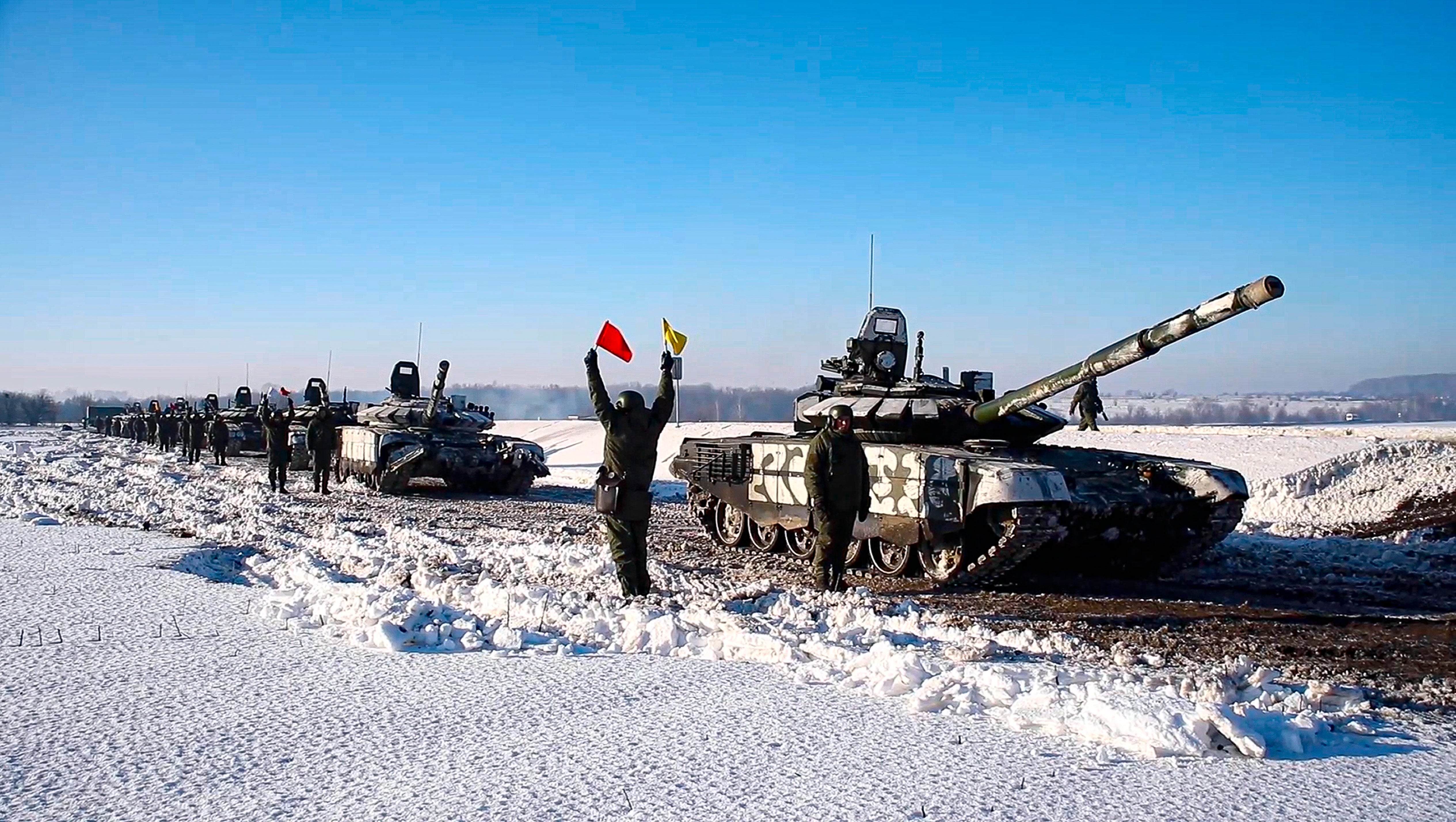Johnson: ‘Mixed signals’ from Moscow but diplomacy over Ukraine remains option
The Prime Minister said there was a ‘diplomatic opening’ but Russia could send troops into Ukraine at ‘any time’.

Your support helps us to tell the story
From reproductive rights to climate change to Big Tech, The Independent is on the ground when the story is developing. Whether it's investigating the financials of Elon Musk's pro-Trump PAC or producing our latest documentary, 'The A Word', which shines a light on the American women fighting for reproductive rights, we know how important it is to parse out the facts from the messaging.
At such a critical moment in US history, we need reporters on the ground. Your donation allows us to keep sending journalists to speak to both sides of the story.
The Independent is trusted by Americans across the entire political spectrum. And unlike many other quality news outlets, we choose not to lock Americans out of our reporting and analysis with paywalls. We believe quality journalism should be available to everyone, paid for by those who can afford it.
Your support makes all the difference.Boris Johnson has said there are “mixed signals” coming out of Russia about the prospect of an invasion of Ukraine – but an “avenue for diplomacy” remains open.
Russian President Vladimir Putin also said he was prepared for further talks with the US and Nato to ease tensions in eastern Europe.
Following a meeting of the Cobra emergency committee, Mr Johnson suggested there is a “diplomatic opening” to resolve the crisis without a war.
But the Russians have the preparations in place to launch an invasion at “virtually any time”, he added, despite claims from Moscow that forces were being scaled down following the conclusion of military exercises near the Ukrainian border.
The Prime Minister said the intelligence he has received about Russian military activity is “not encouraging”, with the construction of field hospitals and the movement of extra forces closer to the border suggesting preparations are still being made for an invasion.
Russia’s defence ministry said some troops and equipment were returning to base following military drills.
But Mr Johnson said intelligence suggests “you have got more battalion tactical groups being brought closer to the border”.
“So, mixed signals, I think, at the moment,” he said.
Responding to reports that US intelligence sources believe an invasion could commence at 3am local time – 1am in the UK – on Wednesday, Mr Johnson said: “We think they have a huge preparation ready to go at virtually any time – 130,000 troops or more, a huge number of battalions – more than 90 battalion tactical groups – and they are stationed around the Ukrainian border.”
He suggested Mr Putin could order a strike from Belarus, through eastern Ukraine or up from southern Ukraine through Odesa and Kherson.
“There a lot of options that they have,” he said.
Foreign Secretary Liz Truss suggested a “false flag” operation could be launched within days to give Moscow the pretext to launch an offensive.
But Mr Johnson said the UK’s embassy in Kyiv will remain open, despite the risk of an invasion and the decisions made by allies to close their diplomatic missions in the capital.
Mr Putin, speaking following talks with German Chancellor Olaf Scholz in Moscow, said he was ready for negotiations with the US and the Nato alliance on limits for missile deployments and military transparency.
But he said Nato was rejecting Moscow’s demands to take membership of the alliance off the table for Ukraine and other former Soviet nations, halt weapons deployments near Russia’s borders and scale back force levels in eastern Europe.
Mr Putin said Russia did not want war, adding: “This is exactly why we put forward the proposal to start the negotiation process, where the result should be an agreement of ensuring equal security of everyone, including our country.
“Unfortunately there was no constructive response to this proposal.”
But he said there are still “elements that can be discussed”.
Nato general secretary Jens Stoltenberg said the “door remains open” for Ukraine to join the alliance.
Mr Johnson called on Russia to withdraw its battalions away from the “potential theatre of conflict” and give “a sense that things are being scaled back, scaled down, that the threat is over and that a conversation and negotiation is beginning”.
He warned that if Russia does invade, a tough package of sanctions will target Russian money in the UK.
That means “Russian banks, Russian companies” and taking extra steps to “unpeel the facade” of Russian property holdings and corporate ownership in the UK.
It would also prevent Russian firms from raising capital on London’s financial markets.
Mr Johnson discussed the economic response to a Russian invasion in a call with European Commission chief Ursula von der Leyen.
“He welcomed the unity of allies, but said more could be done to strengthen coordinated measures at pace,” a No 10 spokesman said.
The two leaders agreed “the world needs to remain vigilant in the coming hours and days”.
Mr Stoltenberg said there was cause for “cautious optimism” in resolving the Ukraine crisis peacefully.
But he also questioned Russia’s claims to have withdrawn troops, telling a press conference in Brussels: “So far we have not seen any de-escalation on the ground – not seen any signs of reduced Russian military presence on the borders of Ukraine.”
Russian foreign minister Sergei Lavrov said military drills are held “on (Russia’s) own territory and according to its own plans – they start, go on and end as planned”.
The exercises are held to a schedule regardless of “who thinks what and who gets hysterical about it, who is deploying real informational terrorism”, he said.
Ukraine’s foreign minister, Dmytro Kuleba, said: “When we see troops pulling out, we’ll believe in de-escalation.”